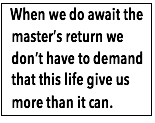|
We understand our lives best when we see them against the
horizon of the infinite. Nowhere is this more important
than in the belief that there is a life beyond this one.
Today it is not always fashionable to say this. More and
more, theologians and spiritual writers are either
ignoring the importance of life after death or, worse
still, positively denigrating any emphasis one might want
to put on it. For example:
A few years ago, I was watching a discussion on television
between a prominent religious commentator and a panel of
theologians representing a number of Christian churches.
The commentator asked the panel this question:
“Should it make any difference in the way you live
whether or not you believe in life after death?”
Everyone on the panel and the host himself agreed that it
shouldn’t. In their view of things, whether or not
you believe in life after death shouldn’t make any
difference practically in the way you live. Each asserted
that they believed in individual immortality, but each
also said that this didn’t, and shouldn’t,
influence their daily actions in a practical way.
Moreover they pushed things further: Several of them
suggested that focusing on belief in life after death can
be positively harmful because it can deflect a person off
of the proper agenda for this life, work against strong
involvement in this world, and tie one immaturely to a
system of rewards and punishments. Belief in life after
death, for them, can throw off the proper focus for life
in this world.
What’s to be said about this?
There’s a certain commendable stoicism in it to be
sure, but, at the end of the day, such a view of things is
religiously false and wreaks a certain havoc in our lives.
What’s wrong is not that God, or anyone else, is
disappointed with our theological inconsistency.
What’s wrong is that we are more prone to do
violence to ourselves and to others because life cannot
give us what we want.
 Simply put, when we stop believing in life after death
we tend to put too much pressure on this life to give us
the full symphony. When we stop seeing our lives as being
completed by something beyond the present world, it
becomes natural to become more frustrated with the limits
of our lives and to begin to demand, however subtly or
unconsciously, that our spouses, children, friends,
careers, jobs, and vacations give us something they
can’t give, namely, complete fulfillment, full
meaning, final satisfaction, joy beyond frustration,
ecstasy, heaven. Simply put, when we stop believing in life after death
we tend to put too much pressure on this life to give us
the full symphony. When we stop seeing our lives as being
completed by something beyond the present world, it
becomes natural to become more frustrated with the limits
of our lives and to begin to demand, however subtly or
unconsciously, that our spouses, children, friends,
careers, jobs, and vacations give us something they
can’t give, namely, complete fulfillment, full
meaning, final satisfaction, joy beyond frustration,
ecstasy, heaven.
When we stop, practically, believing in a heaven beyond
this life, we too easily demand that we have a taste of
heaven right now. Crassly stated, if this life is our only
kick at the cat, it becomes pretty hard to handle the fact
that this one kick at it is almost always a long, long
ways from what we would want it to be. None of us goes
through this life without our share of bitter
disappointment, crushed potential, broken dreams, and
daily frustration. Our lives are never the way we dreamed
them to be. There’s always a huge gap between our
dignity, our desire, our potential, and the actual state
within which we find ourselves. We come into this world
over-charged, are all too soon beaten-up, and never quite
find the end of the rainbow. There are no perfect lives.
There is no heaven this side of eternity.
All of us have suffered abuse of body and heart. All of us
have been unjustly robbed of our potential. All of us live
inside situations of tension, bitterness, gossip, and
hatred. All of us suffer a certain silence between
ourselves and those we most love, and all of us suffer the
absence of full embrace and sexuality in our lives. None
of us have the whole symphony and none of have joy without
shadow. All of us too live with a history of bad choices,
mistakes, sins, and opportunities missed.
Thus, unless we can somehow place our present lives
against an horizon of an after-life that completes it, the
punishing limits, daily inadequacy, and brute mortality of
this world will eventually drive us to depression,
bitterness, or violence. Outside of a vision of life after
death, we can’t come to full peace with this life,
the sophisticated stoicism of so much of contemporary
theology and spirituality notwithstanding.
In one of the parables, Jesus points out how those
servants who do not expect their master’s return go
about getting drunk and beating their fellow-servants.
This image of violence is precisely a metaphor for the
type of violence we do to life and to each other when we
do not see our lives against the horizon of the
master’s return.
Conversely, when we do await the master’s return we
don’t have to demand that this life give us more than
it can and we can more easily live without impatience,
bitterness, and violence, even inside of lives that are far
from complete.
Fr. Ron Rolheiser
|